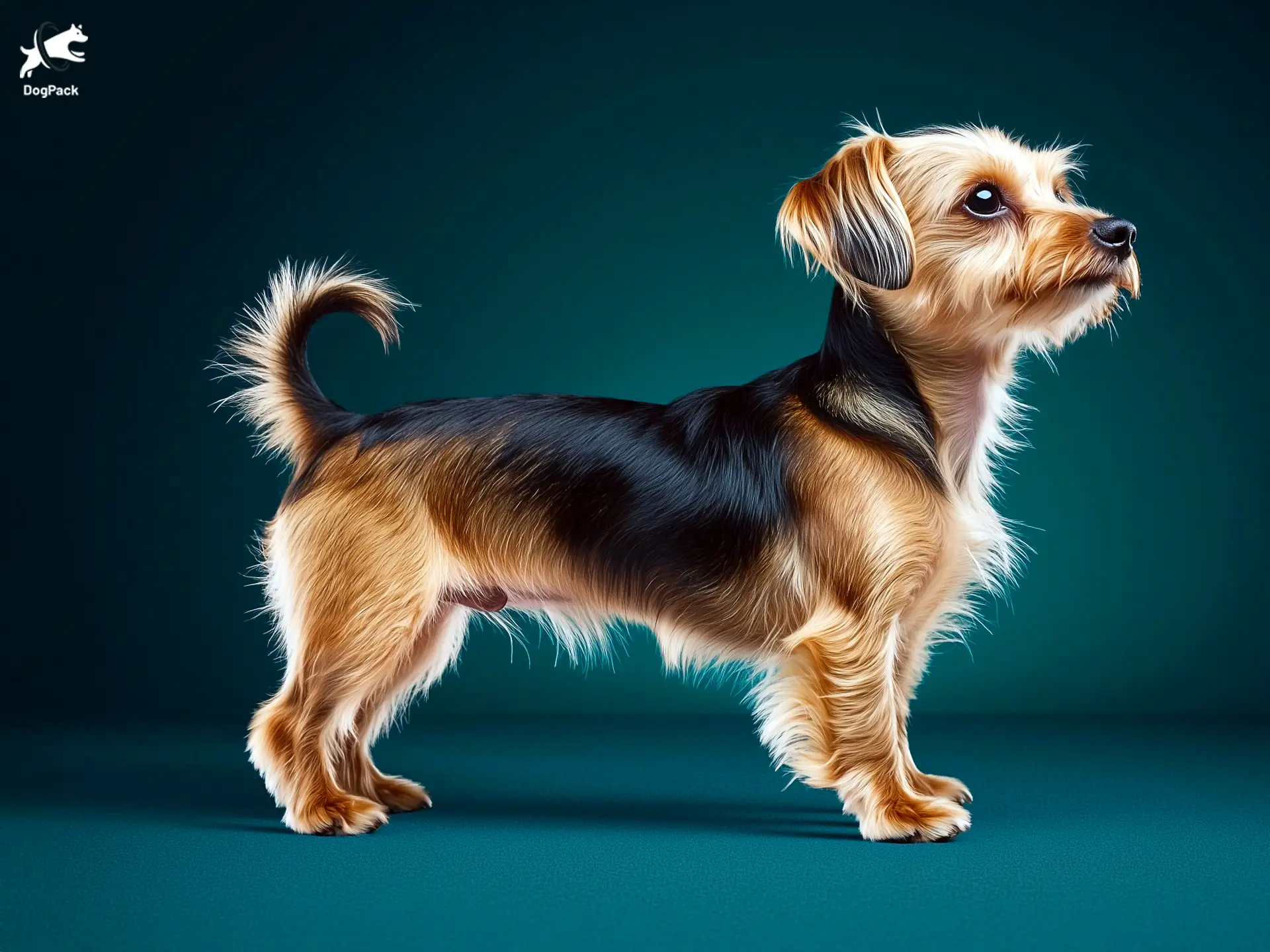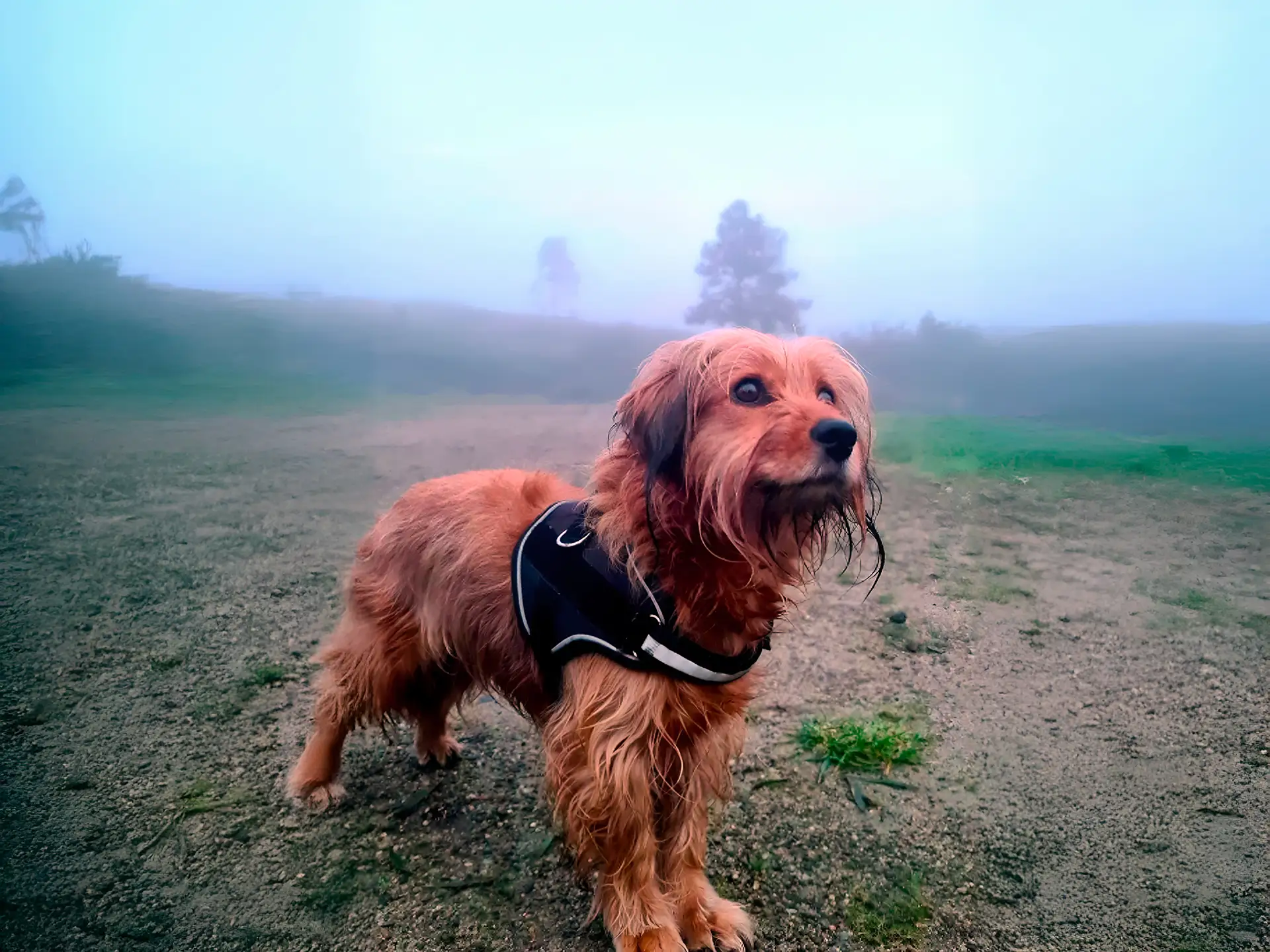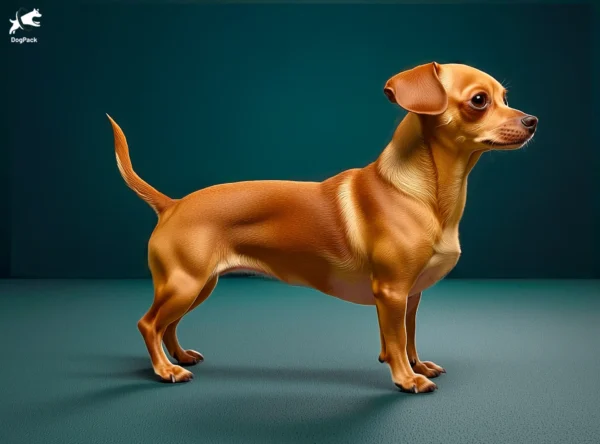Dorkie Dog Breed Info & Overview
The Dorkie, a delightful mix of the spunky Dachshund and the elegant Yorkshire Terrier, is a small, affectionate companion bursting with personality. Known for their playful and loyal nature, Dorkies make fantastic pets for families and individuals alike. Their compact size and adaptable temperament make them perfect for apartment living, offering a blend of charm and companionship in a pint-sized package.
Characteristics
Pictures
Breed History
The Dorkie is a relatively new hybrid breed, combining the spirited Dachshund with the elegant Yorkshire Terrier. This mix likely originated in the United States within the last few decades, during the rise in popularity of designer dogs. Breeders aimed to blend the Dachshund’s playful nature with the Yorkie’s affectionate personality.
While the Dorkie doesn’t have a long history, its parent breeds boast rich backgrounds. Dachshunds were developed in Germany for hunting badgers, prized for their determination and courage. Yorkshire Terriers, on the other hand, originated in England, bred to catch rats in textile mills and known for their sophisticated appearance.
The fusion of these two breeds results in a small dog with a big personality. The Dorkie inherits traits from both parents, creating a unique companion that’s both loyal and entertaining. As hybrid breeds gain recognition, the Dorkie continues to grow in popularity among dog enthusiasts seeking a distinctive pet.
Temperament, Personality
Dorkies are known for their affectionate and playful nature. They thrive on human companionship and love to be involved in all family activities. Their small size doesn’t diminish their big hearts, and they often form strong bonds with their owners, making them excellent lap dogs and loyal companions.
With children, Dorkies can be gentle and loving, but supervision is recommended due to their small stature. They generally get along well with other pets, especially when socialized from a young age. Their Dachshund lineage may contribute to a slight stubborn streak, but their eagerness to please usually prevails.
When it comes to strangers, Dorkies may be a bit reserved at first but often warm up quickly. Their alertness makes them good little watchdogs, and they may bark to announce visitors. Early socialization helps ensure they grow into well-rounded adults comfortable in various social settings.
Physical Characteristics
Dorkies are small dogs, typically weighing between 5 to 12 pounds (2–5 kg) and standing 5 to 9 inches (13–23 cm) tall. Their compact size makes them ideal for apartment living and easy to carry around. Despite their diminutive stature, they carry themselves with confidence and charm.
The coat of a Dorkie can vary, often reflecting a mix of their parent breeds. They may have the long, silky hair of a Yorkshire Terrier or the shorter, coarser coat of a Dachshund. Common colors include black, tan, brown, and combinations thereof. Regular grooming helps maintain their coat’s health and appearance.
Distinctive features of the Dorkie include their expressive eyes and perky ears, which can be either erect or floppy. Their bodies may be slightly elongated like the Dachshund or more proportionate like the Yorkie. Overall, they possess an endearing look that captures hearts wherever they go.
Health Issues
Like all breeds, Dorkies may be prone to certain health issues inherited from their parent breeds. Common concerns include dental problems due to their small mouths, patellar luxation (dislocated kneecaps), and hip dysplasia. Regular veterinary check-ups are essential to monitor their health and catch any issues early.
Dorkies may also be susceptible to eye conditions such as cataracts or progressive retinal atrophy. Keeping their eyes clean and scheduling regular eye exams can help maintain their ocular health. Additionally, due to their Dachshund heritage, some Dorkies may be at risk for back problems, so it’s important to handle them carefully.
Preventive care, including a balanced diet, regular exercise, and vaccinations, contributes to a long and healthy life for your Dorkie. Dental hygiene is particularly important; brushing their teeth regularly can prevent periodontal disease. By staying proactive about their health, you can ensure your Dorkie remains a happy companion for years to come.
Grooming Needs
Grooming a Dorkie can be moderately demanding, depending on the type of coat they inherit. If they have a longer, silky coat like a Yorkie, they’ll require daily brushing to prevent tangles and matting. A shorter coat resembling the Dachshund’s may need less frequent brushing but still benefits from regular care.
Regular baths help keep your Dorkie’s coat clean and healthy, typically every 4 to 6 weeks. Be sure to use a gentle dog shampoo to avoid skin irritation. Trimming around the eyes and ears may be necessary to prevent hair from obstructing vision or causing ear infections.
Don’t forget about nail trimming, ear cleaning, and dental care as part of your Dorkie’s grooming routine. Nails should be trimmed monthly to prevent overgrowth, and ears checked weekly for signs of infection. Brushing their teeth several times a week helps maintain good oral health.
Exercise Requirements
Despite their small size, Dorkies have a moderate energy level and enjoy daily exercise. A total of 30 to 60 minutes of activity per day is sufficient to keep them physically and mentally stimulated. This can include walks around the neighborhood, playtime in the yard, or indoor games.
Dorkies love interactive play, such as fetch or tug-of-war, which helps strengthen the bond between you and your pet. Puzzle toys and treat-dispensing toys can also provide mental stimulation, keeping their intelligent minds engaged. Remember to tailor activities to their size and energy level.
Due to their Dachshund ancestry, it’s important to avoid activities that put undue strain on their backs, such as excessive jumping or climbing stairs. Keeping exercise low-impact helps prevent potential back injuries. Regular activity not only keeps your Dorkie fit but also helps curb any unwanted behaviors stemming from boredom.
Training Tips
Dorkies are intelligent but can sometimes exhibit a stubborn streak, a trait inherited from their Dachshund parent. Positive reinforcement methods, using treats and praise, work best when training them. Patience and consistency are key to overcoming any reluctance and making training sessions enjoyable.
Early socialization is crucial for Dorkies to develop into well-mannered adults. Expose them to different people, pets, and environments to build their confidence. Enrolling in puppy classes can provide structured learning and valuable social experiences with other dogs.
Housebreaking might require extra attention, as smaller breeds can be more challenging to potty train. Establish a regular routine and take your Dorkie outside frequently, especially after meals and naps. Crate training can also be an effective tool in teaching them proper bathroom habits.
Nutrition, Diet
Feeding your Dorkie a high-quality dog food formulated for small breeds is essential. Due to their size and energy level, they require a diet rich in protein and healthy fats. Typically, they need about ½ to 1 cup of dry kibble per day, divided into two meals to prevent overeating and maintain energy levels.
Monitor your Dorkie’s weight closely, as small dogs can be prone to obesity, which may lead to health issues like diabetes or joint problems. Adjust portion sizes based on their activity level and consult your veterinarian for personalized feeding recommendations. Avoid feeding table scraps, as they can contribute to weight gain and nutritional imbalances.
Some Dorkies may have sensitive stomachs or food allergies. If you notice signs like itching, digestive upset, or skin issues, consider switching to a hypoallergenic or limited-ingredient diet. Always introduce new foods gradually and consult your vet before making significant changes to their diet.
Adoption, Breeders
If you’re considering adding a Dorkie to your family, start by checking local animal shelters and rescue organizations. Hybrid breeds like the Dorkie often end up in shelters and are in need of loving homes. Adopting not only gives a dog a second chance but can also be a rewarding experience.
When searching for a breeder, it’s important to find one who is reputable and prioritizes the health and well-being of their dogs. Ask for health clearances of both parent breeds and visit the breeding facility to observe the conditions. Responsible breeders will be transparent and happy to answer your questions.
Resources like the American Kennel Club provide guidance on finding trustworthy breeders. Additionally, websites like Petfinder can help you locate Dorkies available for adoption in your area. Remember, taking the time to find a healthy, well-socialized puppy will lead to a happier relationship in the long run.
Family Pet?
Dorkies make excellent family pets due to their affectionate and friendly nature. They enjoy being part of family activities and thrive on attention. Their small size and gentle disposition make them suitable companions for older children who understand how to handle small dogs respectfully.
With proper socialization, Dorkies can get along well with other pets in the household, including dogs and cats. Introducing them to other animals at a young age helps foster positive relationships. They may have a bit of a prey drive due to their Dachshund heritage, so supervision around smaller pets is advised.
Overall, Dorkies adapt well to various family dynamics, whether in a bustling household or a quieter environment. Their adaptability and desire to please make them delightful companions for individuals and families alike. Providing them with love and care ensures they become cherished members of the family.
Right For You?
If you’re looking for a small, loving companion with a playful spirit, the Dorkie might be the perfect match. They are well-suited to apartment living due to their size and moderate exercise needs. Busy urban environments or quiet suburban homes can both be comfortable settings for this adaptable breed.
Dorkies require companionship and may not do well if left alone for extended periods. They thrive when they can spend quality time with their owners. If you have the time to dedicate to their grooming and social needs, a Dorkie can be a rewarding addition to your life.
Consider your ability to meet the Dorkie’s needs for exercise, grooming, and social interaction. Their charming personality and manageable size make them appealing, but they do require commitment. If you’re prepared to provide a loving home, the Dorkie could be a delightful and loyal companion.
Conclusion
Combining the best qualities of the Dachshund and the Yorkshire Terrier, the Dorkie is a charming and affectionate companion. Their small size and adaptable nature make them ideal for a variety of living situations, including apartments and family homes. While they require moderate grooming and regular exercise, the joy they bring to their owners is well worth the effort.
If you’re seeking a loyal, playful, and loving pet, the Dorkie might just be the perfect fit. They thrive on human interaction and become deeply bonded with their families. By providing them with the care and attention they deserve, you’ll gain a devoted friend who enriches your life with their endearing personality.
FAQs
-
Are Dorkies hypoallergenic?
Dorkies may inherit the low-shedding, hypoallergenic coat of the Yorkshire Terrier, but this isn’t guaranteed due to their mixed heritage. If allergies are a concern, spend time with a Dorkie before adopting to see how you react.
-
Do Dorkies get along well with larger dogs?
Though small, Dorkies are bold and may be social with larger dogs if introduced carefully. Early socialization and monitored interactions help them feel comfortable and avoid potential issues due to their size.
-
Do Dorkies bark a lot?
Dorkies may be prone to barking, especially if they inherit the vocal tendencies of their Dachshund parent. Early training and socialization can help manage excessive barking and teach them when it’s appropriate to be quiet.
-
Are Dorkies easy to travel with?
Thanks to their small size and adaptable nature, Dorkies can make excellent travel companions. They often enjoy car rides and can comfortably fit in airline-approved carriers for plane travel. Proper preparation and acclimation are key to stress-free journeys.
-
What kind of toys do Dorkies like?
Dorkies enjoy a variety of toys, including chew toys, squeaky toys, and puzzle games that stimulate their minds. Providing a mix of interactive and solo-play toys can keep them entertained and prevent boredom when you’re not available to play.
Breed Ratings
Dorkies are smart and quick learners but may show occasional stubbornness, requiring patient and consistent training.
This breed loves to play and enjoys interactive games with their owners, making them delightful companions.
With moderate energy, Dorkies need daily activity but are also content to relax and cuddle.
Shedding is low to moderate, especially if they inherit the Yorkie’s coat, making grooming manageable.
They may have a moderate prey drive due to their Dachshund lineage, so caution around small animals is advised.
Grooming needs are moderate; regular brushing and occasional trims keep them looking their best.
Generally eager to please, Dorkies respond well to positive reinforcement despite occasional stubbornness.
This breed prefers company and may experience separation anxiety if left alone for long periods.
Dorkies can be vocal, alerting owners to visitors or unusual noises, but training can manage excessive barking.
Drooling is minimal, making them a tidy choice for owners concerned about cleanliness.
With proper socialization, they get along well with other dogs and enjoy canine companionship.
Generally healthy, but monitoring for breed-specific health issues ensures they stay in top condition.














